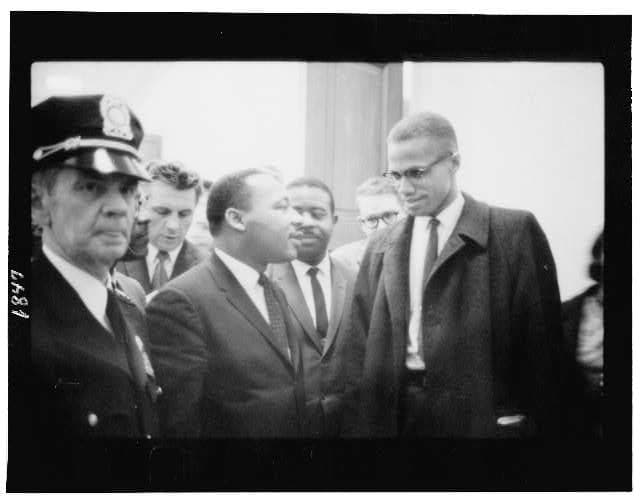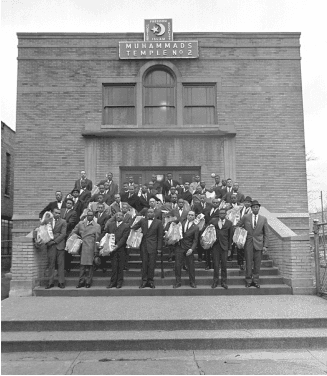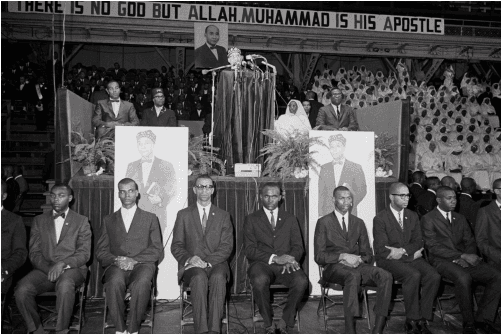Black Religious Nationalism and the Black Power Movement
Maya Hall
9 min read
Listen to this study note
Study Guide Overview
This study guide covers the Nation of Islam's origins and beliefs, Elijah Muhammad's leadership, the transition from the Civil Rights Movement to the Black Power Movement, Malcolm X's evolving philosophy (including self-defense and global solidarity), analysis of his speech "The Ballot or the Bullet", and exam prep with practice questions covering these key topics.
#AP African American Studies: Night Before Review 🚀
Hey! Let's get you feeling confident and ready for this exam. We're going to break down the key stuff, make connections, and get you prepped for anything they throw at you. Let's do this!
#1. Black Religious Nationalism and the Nation of Islam
#1.1. Nation of Islam: Foundations ☪️
- Origins: Founded in Detroit, 1930 during the Great Migration. Think of it as a response to both racism and the search for community in new urban environments.
- Core Beliefs:
- Blended Islamic tenets with Black Nationalist ideology.
- Unique mythology: Black people as the original humans; white people created by an evil scientist named Yakub. This reversed racial hierarchy, promoting Black pride. 💡
- Promoted self-sufficiency and community building.
- Key Idea: The Nation of Islam provided a sense of identity and empowerment in the face of systemic racism.
Think of the Nation of Islam as a powerful response to racism and a call for Black empowerment, using a unique blend of religion and nationalism.
#1.2. Elijah Muhammad's Leadership
- Leadership: Led the Nation of Islam from 1934 to 1975 from Chicago.
- Name Changes: Encouraged followers to adopt Muslim surnames or use "X" (e.g., Malcolm X, Louis X) to reject slave names and reclaim identity. 🔑
- Economic Empowerment: Established NOI-owned businesses (restaurants, schools, farms) to create a self-sustaining community.
- Black Separatism: Advocated for an independent Black nation within the U.S.
Elijah Muhammad's leadership was crucial in shaping the Nation of Islam's ideology and its impact on the Black community.
#2. Transition from Civil Rights to Black Power
#2.1. Black Power Movement Emergence ✊🏾
- Disillusionment: Mid-1960s, some African Americans felt the Civil Rights movement was too slow and didn't address systemic issues.
- Key Shift: Moved from integration and nonviolence to self-determination, cultural pride, and self-defense.
- Global Influence: Inspired by decolonization movements in Africa and elsewhere.
The Black Power movement was a direct response to the limitations of the Civil Rights movement and a call for more radical change.
#2.2. Malcolm X's Principles
- Background: Muslim minister and activist, initially with the Nation of Islam, then left in 1964. * Autonomy: Advocated for Black-owned institutions rather than integration. 🏢
- Self-Reliance: Believed Black people needed to develop pride in their own culture and rely on themselves.
- Self-Defense: Criticized nonviolence, arguing for the right to self-defense against violence. 🛡️
- Influence: Shaped groups like the Black Panther Party and SNCC with his emphasis on self-defense and solidarity.
#2.3. Malcolm X on Self-Defense
- Armed Self-Defense: Encouraged African Americans to exercise their Second Amendment rights. ⚔️
- Critique of Nonviolence: Argued nonviolence was ineffective against systemic violence.
- Famous Quote: "I don't call it violence when it's self-defense, I call it intelligence." 💡
- Influence on Black Panthers: Inspired their practice of armed self-defense and monitoring police activity.
#2.4. Malcolm X's Evolving Ideas
- Shift: Left the Nation of Islam in 1964, embraced Sunni Islam after visiting Mecca.
- Internationalism: Moved from Black separatism to a global perspective on oppression. 🌍
- Pan-Africanism: Pursued Black nationalism, pan-African solidarity, and human rights.
- Global Alliances: Built relationships with leaders in Africa and the Middle East.
- Legacy: His ideas continued to inspire the Black Power movement even after his assassination in 1965. Memory Aid
Think of Malcolm X's journey as a transformation from separatism to global solidarity. His evolution shows how ideas can change and grow through experience and reflection.
#3. Required Sources
#3.1. "The Ballot or the Bullet" by Malcolm X, 1964
- Main Idea: Black Americans must choose between political action (ballot) or self-defense (bullet). 🗳️ 🔫
- Key Points:
- Elevate civil rights to human rights for international support.
- Black nationalism: control of politics, economy, and social structures.
- Criticism of Democrats and white liberals.
- Call for unity among Black Americans.
- Advocacy for self-defense and the right to bear arms.
- Emphasis on political education and strategic voting.
- Critique of integration, favoring community control.
- Call for economic self-sufficiency and community reinvestment.
- Warning of potential armed conflict if peaceful means are exhausted.
- Significance: Highlights the growing militancy and shift towards more radical approaches.
Be ready to analyze Malcolm X's "The Ballot or the Bullet" speech. Know its main arguments and how it reflects the transition from Civil Rights to Black Power.
#3.2. Malcolm X and Martin Luther King Jr. After Press Conference at United States Capitol, 1964

- Context: Rare moment of unity between two influential but different voices.
- Symbolism: Highlights the complex dynamics within African American leadership.
- Significance: Shows how leaders with different approaches could unite for a common goal.
This image is a powerful symbol of the diverse strategies within the Civil Rights Movement.
#3.3. Muhammad Speaks Newspaper Salesmen, 1965

- Role: Official publication of the Nation of Islam, spreading Black nationalist thought.
- Outreach: Demonstrates grassroots efforts to reach audiences beyond religious spaces.
- Significance: Shows the power of print media in community organizing and consciousness-raising.
#3.4. Elijah Muhammad Addressing Black Muslims at Convention, 1966

- Context: Pivotal moment in the development of the Nation of Islam.
- Message: Emphasized economic self-reliance, moral discipline, and racial separation.
- Significance: Highlights alternative approaches to racial equality beyond mainstream civil rights.
#4. Final Exam Focus
#4.1. Highest Priority Topics
- Nation of Islam: Understand its origins, beliefs, and impact on Black communities.
- Malcolm X: Know his evolving ideas, especially his views on self-defense and global solidarity.
- Black Power Movement: Grasp its emergence, principles, and key figures.
- "The Ballot or the Bullet": Be able to analyze its main arguments and significance.
Focus on the connections between the Nation of Islam, Malcolm X, and the Black Power movement. These topics are frequently tested.
#4.2. Common Question Types
- Multiple Choice: Expect questions on the core beliefs of the Nation of Islam, Malcolm X's philosophy, and the differences between Civil Rights and Black Power.
- Short Answer: Be prepared to explain the significance of key figures, events, and documents.
- Free Response: Practice analyzing primary sources (like "The Ballot or the Bullet") and comparing different approaches to racial equality.
Practice analyzing primary sources and making connections between different movements and figures. This will help you score higher on FRQs.
#4.3. Last-Minute Tips
- Time Management: Pace yourself. Don't spend too long on any one question.
- Common Pitfalls: Avoid oversimplifying complex issues. Acknowledge different perspectives.
- Strategies: Read questions carefully. Plan your essays. Use evidence from the sources.
- Stay Calm: You've got this! Review your notes, take deep breaths, and trust your preparation.
#5. Practice Questions
Practice Question
#Multiple Choice Questions
-
Which of the following best describes a core belief of the Nation of Islam? (A) Integration with white society (B) Nonviolent resistance (C) Black separatism and self-sufficiency (D) Universal human rights regardless of race
-
Malcolm X's philosophy evolved from advocating for Black separatism to embracing which of the following? (A) Strict adherence to nonviolence (B) A global perspective on oppression and pan-African solidarity (C) Political integration within the United States (D) A focus on individual achievement over collective action
-
What was a major factor that contributed to the rise of the Black Power movement? (A) The complete success of the Civil Rights movement (B) Disillusionment with the slow pace of integration and persistent racial inequality (C) The decline of racial discrimination in the United States (D) The widespread acceptance of nonviolent tactics
#Free Response Question
Question: Analyze the ways in which Malcolm X's ideas and actions contributed to the transition from the Civil Rights Movement to the Black Power Movement. In your response, be sure to discuss his views on self-defense, Black autonomy, and his evolving perspectives on race and liberation. Use the provided sources and your knowledge of the period to support your claims.
Scoring Breakdown:
- Thesis (1 point): A clear and defensible thesis statement that addresses the prompt.
- Analysis of Malcolm X's Ideas (3 points):
- Discussion of his views on self-defense and criticism of nonviolence.
- Explanation of his advocacy for Black autonomy and self-reliance.
- Analysis of his evolving perspectives on race, separatism, and global solidarity.
- Connection to Black Power Movement (2 points):
- Explanation of how Malcolm X's ideas influenced the Black Power movement.
- Discussion of the movement's emphasis on self-determination and cultural pride.
- Use of Sources (2 points):
- Effective use of "The Ballot or the Bullet" to support your analysis.
- Reference to the provided images to add context and depth.
- Synthesis/Argumentation (1 point):
- Demonstrates clear and consistent argumentation throughout the response.
- Provides a nuanced understanding of the complexities of the transition from Civil Rights to Black Power.
You've got this! Go crush that exam! 💪🏾
Continue your learning journey

How are we doing?
Give us your feedback and let us know how we can improve





